








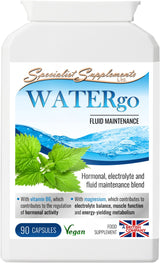
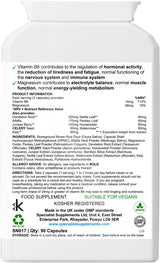
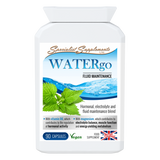
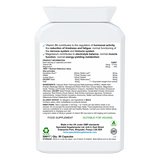
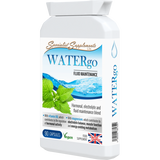
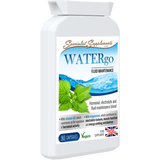
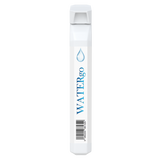
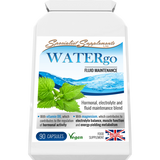
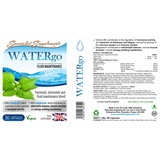
WATERgo
Say goodbye to bloating and discomfort caused by excess water retention with WATERgo! This revolutionary supplement is packed with concentrated herbals and nutrients that naturally support healthy fluid levels in the body.
WATERgo's unique blend encourages the body's natural elimination of stored water and waste via the kidneys, reducing bloating and puffiness. Each capsule is packed with vitamin B6 and magnesium, two essential nutrients that have a wide range of health benefits. Vitamin B6 helps to regulate hormonal activity, boost energy metabolism, and reduce tiredness and fatigue. Magnesium is essential for maintaining healthy bones, teeth, and muscle function, as well as supporting psychological function and electrolyte balance.
Recommended by NOW magazine and Dr Mark Atkinson, WATERgo is the ultimate solution for anyone looking to feel more comfortable and energized. Try it today and feel the difference!.
-90 capsules per pot-Kosher approved
Take 2 capsules (1 serving), 1 to 3 times per day before meals or as advised.

Water retention, also known as edema, occurs when excess fluid builds up in the body's tissues. Here are some interesting facts about water retention:
-
Common Occurrence: Mild water retention is a common occurrence and can affect anyone, regardless of age or gender.
-
Causes: Water retention can be caused by various factors, including high salt intake, hormonal changes (such as during menstruation or pregnancy), standing or sitting for extended periods, and certain medical conditions like heart or kidney problems.
-
Body Composition: The human body is composed of roughly 60% water. Water retention is the body's natural response to maintaining fluid balance and can help protect against dehydration.
-
Edible Diuretics: Some foods, like cucumber, watermelon, and celery, have natural diuretic properties that can help reduce water retention by increasing urine output.
-
Medication Side Effects: Certain medications, such as corticosteroids and some blood pressure medications, can cause water retention as a side effect.
-
Pitting Edema: In cases of severe water retention, known as pitting edema, pressing a finger into the swollen area can leave a temporary indentation (pit) that slowly fills back in. This is a common diagnostic test for edema.
-
Heat and Gravity: Hot weather and gravity can exacerbate water retention. The heat causes blood vessels to expand, and gravity can pull fluids downward, leading to swelling in the legs and feet.
-
Exercise Helps: Regular physical activity can help reduce water retention by improving circulation and encouraging the body to eliminate excess fluids through sweat and urine.
-
Salt Sensitivity: Some individuals are more sensitive to dietary salt (sodium). Consuming too much salt can lead to increased water retention, especially in those who are salt-sensitive.
-
Medical Conditions: Water retention can be a symptom of underlying medical conditions, such as heart failure, liver disease, or kidney disease. It's important to consult a healthcare professional if you experience chronic or severe water retention.
-
Lymphatic System: The lymphatic system plays a crucial role in regulating fluid balance in the body. Problems with this system can contribute to water retention.
-
Treatment Options: Treatment for water retention depends on the underlying cause. It may include dietary changes, reducing salt intake, wearing compression stockings, elevating the legs, or using diuretic medications in severe cases.
-
Hydration: Paradoxically, staying well-hydrated can actually help reduce water retention. When the body is adequately hydrated, it's less likely to hold onto excess fluids.
-
Reducing Stress: Chronic stress can also contribute to water retention. Stress management techniques, such as meditation and deep breathing exercises, may help alleviate this symptom.
-
Temporary Phenomenon: In most cases, mild water retention is a temporary and harmless condition. However, it can be a sign of an underlying health issue when it becomes chronic or severe.
If you're concerned about water retention, it's essential to consult with a healthcare provider to determine the cause and appropriate management strategies.
